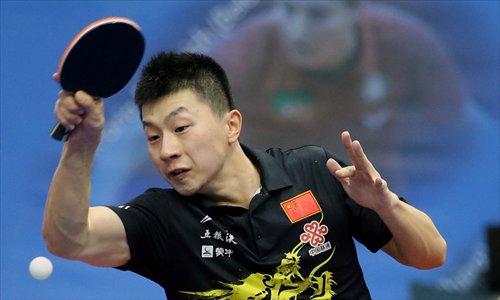HOME >> SPORTS
Foreigners should train with China team: ITTF
Source:Reuters Published: 2014-1-17 20:03:01

China's Ma Long returns a shot to his compatriot Xu Xin during the men's singles final at the ITTF World Tour Grand Finals in Dubai on January 12. Photo: CFP

Adham Sharara Photo: CFP
China's table tennis federation should give foreign players more access to its coaches to ease the country's stranglehold on the sport and attract more television and sponsor interest, the head of the world governing body said.In the men's game, Chinese players have won seven of the past eight biennial world championships, while China's women have claimed the last 10 titles.
"It reminds me of 20 years ago when the US was dominating basketball - they (the US) were able to promote the sport elsewhere and bring the top players from other countries to the NBA," said Adham Sharara, president of the International Table Tennis Federation (ITTF).
"Today, the US is still very strong but doesn't dominate like how China dominates our sport."
The Canadian said lesser Chinese preeminence would help attract greater sponsorship and television coverage of table tennis, which has been an Olympic sport since 1988.
Low prize money
Globally, there are 217 national federations, second only to volleyball, but the prize money on offer is a pittance compared with many sports.
The World Tour Grand Finals in Dubai last weekend - table tennis' richest event - had a total cash pot of $878,000 for the men's and women's singles and doubles tournaments.
Novak Djokovic, the world No.2 in men's tennis, earned $1.92 million for winning December's ATP World Tour Finals.
"Even in China itself, the general public is getting tired of seeing China winning all the time," said Sharara.
"We need more cooperation from the Chinese. They're opening the door but ever so slowly. They need to sacrifice to make the others better, even to lose to the others, so the sport becomes more and more interesting.
"I say help us for just five years and then you can go back and close the doors."
Sharara said this help would mainly consist of allowing young players from other countries to train with China's elite players, not just provincial teams, plus access to China's equipment technology, which is superior. The top five men and top four women in the world rankings are all Chinese.
Men's No.1 Ma Long told Reuters he would welcome foreign players to practice with him.
"Chinese players dominate, so maybe the prize money is a bit low for the other players," said Ma.
He spoke through an interpreter and the lack of foreign language skills among China's players has also made promoting the game more difficult.
"I'm trying to convince the Chinese federation that their top players must speak English, so now they're giving them English courses," said Sharara.
"This generation is a little bit too shy, but the next generation, the younger ones, are speaking English already."
This would help sell the sport to broadcasters, he said.
"Also in terms of personality - in China they're seen as different individual personalities. There's the naughty guy, the nice guy, the good-looking guy, but outside China they're all considered the same, just the Chinese team because they don't communicate enough," said Sharara.
Eighteen nations were represented in Dubai, but the men's and women's finals were all-Chinese affairs and foreign players seem resigned to their fate.
"We Europeans have a tough job because it's almost impossible to beat all the Chinese," said Natalia Partyka, 24, a three-times Paralympics champion who also plays in able-bodied competition.
"I think the next 10 or 20 years will be the same, still the Chinese will win everything," the Pole added.
New rival
Table tennis also faces a new rival, with Britain's Matchroom Sport staging the $100,000 World Championship of Ping Pong in London earlier this month, in which players use old-fashioned sandpaper bats.
These do not allow players to generate the spin associated with top-level table tennis, which the organizers claim is a virtue.
"Table tennis is not really watchable and I'm not sure the people who run it realize that, whereas ping pong most certainly is," said Luke Riches, Matchroom Sport media director.
"Table tennis is a huge sport played around the world with a governing body. We're not trying to compete with that, we're just trying to provide something entertaining."
Posted in: Feature, Miscellany, Eye on the ball